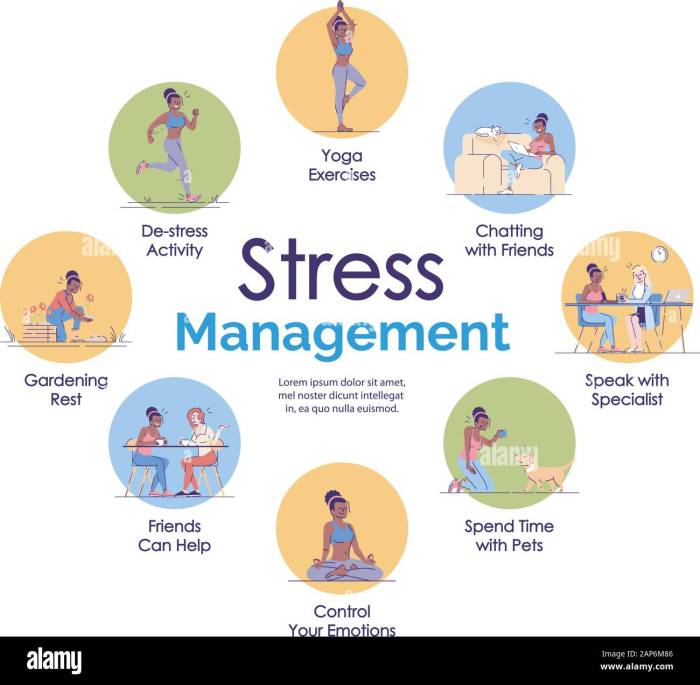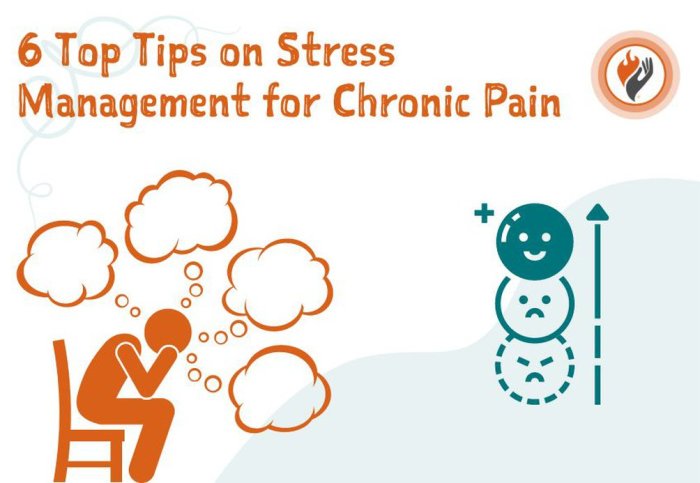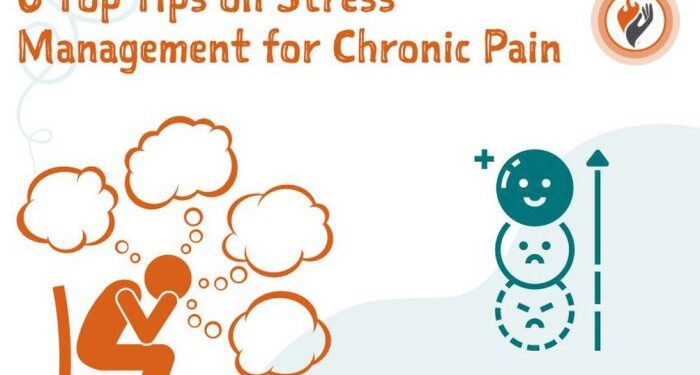Exploring effective ways to manage chronic stress, this article delves into strategies that have been proven to work. From understanding the impact of chronic stress to identifying signs and implementing stress-relief techniques, this comprehensive guide offers valuable insights for improving mental and physical well-being.
As we navigate through the complexities of chronic stress management, it becomes evident that proactive measures can make a significant difference in our overall quality of life.
Understanding Chronic Stress
Chronic stress is a prolonged state of psychological and physiological tension that can have detrimental effects on both mental and physical health. Unlike acute stress, which is short-term and typically related to specific situations, chronic stress persists over an extended period of time and can result from ongoing issues such as work pressures, financial difficulties, or relationship problems.
Impact of Chronic Stress on Health
Chronic stress can lead to a variety of health problems, including an increased risk of heart disease, high blood pressure, weakened immune system, and mental health disorders such as anxiety and depression. The continuous release of stress hormones in the body can disrupt various systems and contribute to the development of chronic conditions.
Examples of Situations Leading to Chronic Stress
Some common examples of situations that can lead to chronic stress include persistent job insecurity, caregiving responsibilities for a sick family member, unresolved personal conflicts, and ongoing financial struggles. These ongoing stressors can overwhelm an individual's coping mechanisms and result in chronic stress.
Long-Term Effects of Chronic Stress
Over time, chronic stress can take a toll on the body, leading to increased inflammation, digestive issues, sleep disturbances, and cognitive impairments. The prolonged activation of the body's stress response can also accelerate the aging process and contribute to the development of chronic diseases.
Identifying Signs of Chronic Stress

Chronic stress can have a significant impact on an individual's physical, emotional, and mental well-being. It is crucial to be able to recognize the signs and symptoms of chronic stress in order to address them effectively before they escalate.
Common Symptoms of Chronic Stress
- Constant fatigue and tiredness
- Irritability and mood swings
- Difficulty concentrating
- Insomnia or sleeping too much
- Physical symptoms such as headaches, stomach issues, or muscle tension
How Chronic Stress Manifests Differently
- Some individuals may experience more physical symptoms, while others may exhibit more emotional signs of stress.
- Chronic stress can also manifest in behavioral changes, such as increased substance use or withdrawal from social activities.
- Each person may have a unique response to chronic stress based on their personality, coping mechanisms, and external stressors.
Recognizing Early Signs of Chronic Stress
- Early recognition of chronic stress can prevent it from escalating into more serious mental health issues.
- Being aware of subtle changes in mood, behavior, and physical health can help identify chronic stress early on.
- Seeking support from healthcare professionals or mental health experts can provide guidance on managing chronic stress effectively.
Real-Life Examples of Chronic Stress Symptoms
- Missing deadlines at work due to difficulty concentrating and feeling overwhelmed.
- Struggling with anger outbursts or irritability in personal relationships because of chronic stress.
- Experiencing chronic headaches or digestive issues as a result of prolonged stress and anxiety.
Effective Stress-Relief Techniques

Managing chronic stress requires a multifaceted approach that includes various stress-relief techniques. These techniques can help individuals cope with the daily pressures and reduce the negative impact of stress on their physical and mental well-being.
Mindfulness, Meditation, and Deep Breathing Exercises
Practicing mindfulness, meditation, and deep breathing exercises are effective ways to calm the mind and body, promoting relaxation and reducing stress levels. Mindfulness involves focusing on the present moment without judgment, while meditation helps in clearing the mind and improving concentration.
Deep breathing exercises can help regulate breathing patterns and activate the body's relaxation response.
- Engage in mindfulness activities such as mindful breathing, body scans, or mindful walking to stay present and reduce stress.
- Set aside time each day for meditation practice to promote relaxation, mental clarity, and emotional balance.
- Practice deep breathing exercises by taking slow, deep breaths and exhaling slowly to calm the nervous system and reduce stress hormones.
Regular Exercise Routine
Regular physical activity is essential for managing chronic stress as it helps release endorphins, the body's natural stress relievers, and improves overall well-being. Establishing a consistent exercise routine can enhance mood, boost energy levels, and reduce feelings of anxiety and depression.
- Find an exercise that you enjoy, whether it's jogging, yoga, swimming, or dancing, and incorporate it into your daily or weekly schedule.
- Set realistic fitness goals and track your progress to stay motivated and committed to your exercise routine.
- Include a mix of aerobic, strength training, and flexibility exercises to reap the full benefits of physical activity for stress relief.
Role of Hobbies and Creative Outlets
Engaging in hobbies and creative outlets can provide a much-needed escape from the stressors of everyday life and foster a sense of accomplishment and fulfillment. Pursuing activities that bring joy and relaxation can help reduce stress levels and improve overall mental health.
- Explore hobbies such as painting, gardening, cooking, or playing a musical instrument to unwind and express creativity.
- Schedule regular time for your hobbies to prioritize self-care and relaxation, even during busy periods.
- Create a dedicated space for your creative pursuits to enhance focus and enjoyment while engaging in stress-relief activities.
Lifestyle Changes for Managing Chronic Stress
Maintaining a healthy lifestyle is crucial in managing chronic stress effectively. This includes focusing on areas such as diet, sleep, social connections, time management, and self-care practices.
Importance of Maintaining a Healthy Diet and Getting Adequate Sleep
Proper nutrition and sufficient sleep play a significant role in managing chronic stress. A balanced diet rich in fruits, vegetables, whole grains, and lean proteins can help regulate mood and energy levels. Similarly, getting 7-9 hours of quality sleep each night supports overall well-being and mental resilience.
Impact of Social Support and Connection on Chronic Stress Management
Social support and meaningful connections with others can act as buffers against chronic stress. Spending time with loved ones, joining support groups, or engaging in social activities can provide emotional comfort, practical assistance, and a sense of belonging that alleviates stress.
Examples of How Time Management and Organization Can Help Reduce Stress
Effective time management and organizational skills can prevent feelings of overwhelm and anxiety often associated with chronic stress. Creating to-do lists, prioritizing tasks, setting realistic deadlines, and delegating responsibilities can promote a sense of control and productivity, reducing stress levels.
Tips for Setting Boundaries and Prioritizing Self-Care to Tackle Chronic Stress
Setting boundaries with work, relationships, and commitments is essential for managing chronic stress. Learning to say no, delegating tasks, and carving out time for self-care activities such as exercise, hobbies, meditation, or relaxation techniques can prevent burnout and promote mental well-being.
Final Wrap-Up
In conclusion, adopting the right strategies for managing chronic stress can lead to a healthier and more balanced lifestyle. By prioritizing self-care, seeking social support, and incorporating relaxation techniques into daily routines, individuals can effectively combat the detrimental effects of chronic stress.
FAQ Corner
What are some effective relaxation techniques for managing chronic stress?
Effective relaxation techniques include mindfulness, meditation, deep breathing exercises, and engaging in hobbies or creative outlets. These activities can help reduce stress levels and promote overall well-being.
How important is social support in managing chronic stress?
Social support plays a crucial role in managing chronic stress as it provides individuals with a sense of belonging, empathy, and understanding. Building strong social connections can help alleviate stress and improve mental health.
Why is setting boundaries important in tackling chronic stress?
Setting boundaries is essential in managing chronic stress as it helps individuals prioritize self-care and prevent burnout. By establishing limits on work demands and personal commitments, individuals can better manage stress levels and maintain a healthy balance.










![Sleep Statistics By Mental Health and Facts [2024*]](https://br.genpi.co/wp-content/uploads/2025/09/VaNVZ-health-issue-impacting-sleep-350x250.png)